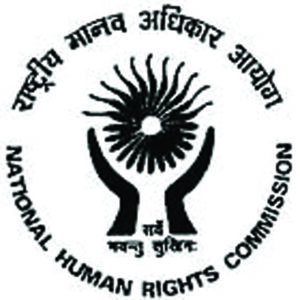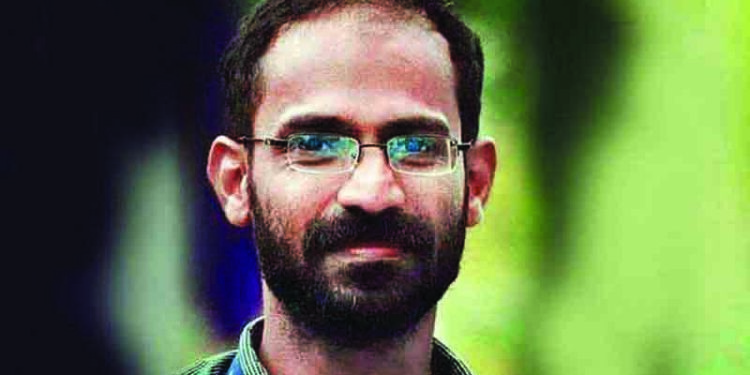PERVEZ BARI
BHOPAL, APR 6
Predictably, the National Human Rights Commission (NHRC), has closed the complaint on the arrest of Kerala journalist Siddique Kappan, jailed since October 5, 2020.

Kappan, also the secretary of the Kerala Union of Working Journalists (KUWF), was on his way to Hathras in Uttar Pradesh (UP), to cover the gang-rape and death of a young woman. Kappan, along with three others, were picked up and arrested under the draconian Unlawful Activities (Prevention) Act, 1967, on charges of allegedly inciting caste and communal violence.
In a bland order passed on April 1, 2021, the NHRC said: “The allegations in the complaint cannot be substantiated and investigation in the matter is still pending. The Commission has considered the material placed on record. SP Hathras is directed to get the investigation completed fairly and to its logical conclusion within reasonable time. Also, DM Hathras is directed to provide monetary relief to victim girl M……. in case 136/20 under applicable rules of SC/ST Prevention of Atrocities Act. With this direction the case is closed”.
Also, in a shocking violation of Sec 228A of the Indian Penal Code (IPC), the order names the Hathras rape victim and insensitively refers to monetary compensation to be given to the ‘victim girl’, without any reference to the fact that she died on September 29, 2020, succumbing to the severe injuries she had sustained when she was gang-raped by four upper caste youth on September 14, 2020.
Adv. Ansar Indori filed the complaint before the NHRC on Oct 5, 2020. The NHRC sought an action taken report on December 2, 2020 and, following another complaint filed by Henri Tiphagne, the commission passed an order closing the matter.
The 19-year-old Dalit girl had gone to collect fodder when the four men – Sandip, Ramu, Lavkush and Ravi, who belonged to the Thakur caste, caught her and assaulted her. She sustained a spinal cord injury and her tongue was cut off when the assailants tried to strangle her with her “dupatta”. Her mother heard her cries and managed to get her to a hospital. Police initially rejected her testimony and registered a complaint only on September 20. In three separate recorded complaints, she said she had been raped and named all the four perpetrators. Her condition worsened and she died in Safdarjung Hospital in Delhi. Uttar Pradesh police, which took custody of the body, cremated her in a hurried manner without the knowledge of her family.
The case had caused a storm of protests all over the country and intense media attention followed for days thereafter. The UP government tried to ban media coverage and stop all access to the family of the victim. The district administration, including the District Magistrate (DM), was recorded on camera trying to coach the family and told that, while the media would go away after a few days, the DM would remain, clearly suggesting that they would still have to contend with him!
The UP government filed no less than 19 First Information Reports (FIRs) alleging conspiracy against the Yogi Adityanath government. The UP government even hired a public relations firm to spin the story that the girl was not gang-raped and that the reports of the incident had “revealed the conspiracy to push the state into caste turmoil.”
In the build-up to this, the UP police arrested the Kerala journalist and three others, Atiqur Rahman, Aalam and Masood, who the police alleged, belonged to the Popular Front of India. The arrest, the KUWJ said, was a clear violation of the journalist’s fundamental right to freedom of expression under Art. 19 as the journalist was on his way to Hathras to fulfil his journalistic duty as a reporter. In a letter to Prime Minister Narendra Modi and UP chief minister Yogi Adityanath, KUWJ said that Kappan is a senior journalist and wrote for azhimukham.com and several other Malayalam media houses.
Several attempts to secure bail for Kappan, including the filing of a habeas corpus petition and a bail application in the Supreme Court, have come to naught. In February, the court allowed Kappan to travel to Kerala for five days to see his ailing mother, with the stringent directive that he only interact with his mother and her doctor.
Kappan’s lawyers tried to move the Supreme Court under Art. 32 of the Constitution, to seek constitutional remedy for violation of fundamental rights. In May 2020, the Republic TV owner-editor Arnab Goswami had successfully used Art. 32 to seek quashing of multiple FIRs against him on charges of inflammatory statements and promoting enmity between religious groups (Section 153A of IPC). But when it came to Kappan’s case, the Chief Justice of India S. A. Bobde said the court was discouraging citizens from approaching it with Art. 32 petitions.
The NHRC, a statutory body is mandated to take up violations of human rights in India, under the Protection of Human Rights Act, (PHRA)1993. Section 2(1) (d) of the PHRA defines Human Rights as the rights relating to life, liberty, equality and dignity of the individual guaranteed by the Constitution or embodied in the International Covenants and enforceable by courts in India. It is headed by a retired Chief Justice or senior judge of the Supreme Court. Justice H. L. Dattu completed his tenure as the seventh Chairperson of the NHRC on 2nd December, 2020. It is currently without a Chairperson.Given the spate of human rights violations in India, the work of the NHRC has never been more important. In a letter to the retiring Chairperson, Dattu, the All-India Network of NGOs and Individuals working with National and State Human Rights Institutions headed by Tipaghne, said: “We expected the Commission to uphold and assert its powers in cases such as the killing of protestors in Thoothukudi, arrest of human rights defenders in Bhima Koregaon case, incarceration of protestors peacefully opposing CAA, and the plight of migrant workers. We re-assert that the NHRC belongs to the people and it always took the cause of victims of human rights violations. We always believe that it is the NHRC that serves as a model for other human rights institutions.”
(Pervez Bari is indiatomorrow.net correspondent based at Bhopal)












